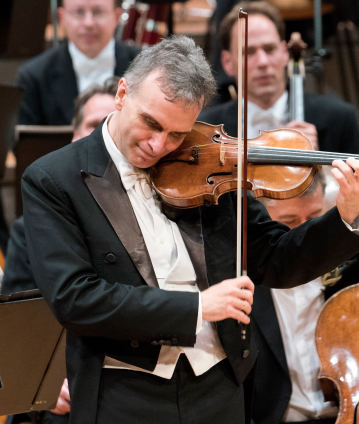Elgar’s Violin Concerto with Gil Shaham and David Zinman

Edward Elgar’s Violin Concerto calls for a soloist who can bring its tenderly autumnal, lyrical tone to life without sentimentality. Gil Shaham, who performed the work here with the Berliner Philharmoniker and conductor David Zinman, is such an artist. Also on the programme was Béla Bartók’s Concerto for Orchestra, which brilliantly alternates between elegy and a defiant will to live.
Ever since the passionate interpretation by Jacqueline du Prè, Edward Elgar’s Cello Concerto has been an indispensable part of the classical repertoire. Elgar’s only violin concerto, on the other hand, has been performed much less frequently until today, although it found an equally passionate champion in Yehudi Menuhin (his recording from the 1930s, conducted by the composer, is unforgettable). The three-movement composition, with its original formal structure, calls for a soloist who can bring its tenderly autumnal, lyrical tone to life without sentimentality. Gil Shaham, who made his debut with the Berliner Philharmoniker in 1988 at the age of 17 and has returned to the orchestra several times since then, is such a soloist.
In the second part of the programme, the American David Zinman presented a work composed in his home country: Béla Bartók, an uncompromising opponent of National Socialism and Fascism, left Europe in 1940 and went into exile in America. During the last years of his life, which were overshadowed by financial worries and a serious illness, he wrote only a few compositions, all of which were inspired, however. A melancholy elegy is the centrepiece of his Concerto for Orchestra, in which not a guest virtuoso but the members of the orchestra are allowed to shine in brilliant solo passages. The second and fourth movements as well as the Finale are characterized by a defiant will to live, elemental rhythmic power and masterful structure; the influence of American jazz is also apparent.
© 2008 Berlin Phil Media GmbH
Artists
Our recommendations
- 2002 Europakonzert from Palermo with Claudio Abbado and Gil Shaham
- Zubin Mehta conducts Saint-Saëns’s “Organ Symphony”
- Susanna Mälkki and Gil Shaham
- Claudio Abbado conducts music from “Carmen” at the 1997 New Year’s Eve Concert
- David Zinman conducts Beethoven and the “Neruda Songs” by Peter Lieberson
- Yo-Yo Ma plays Shostakovich